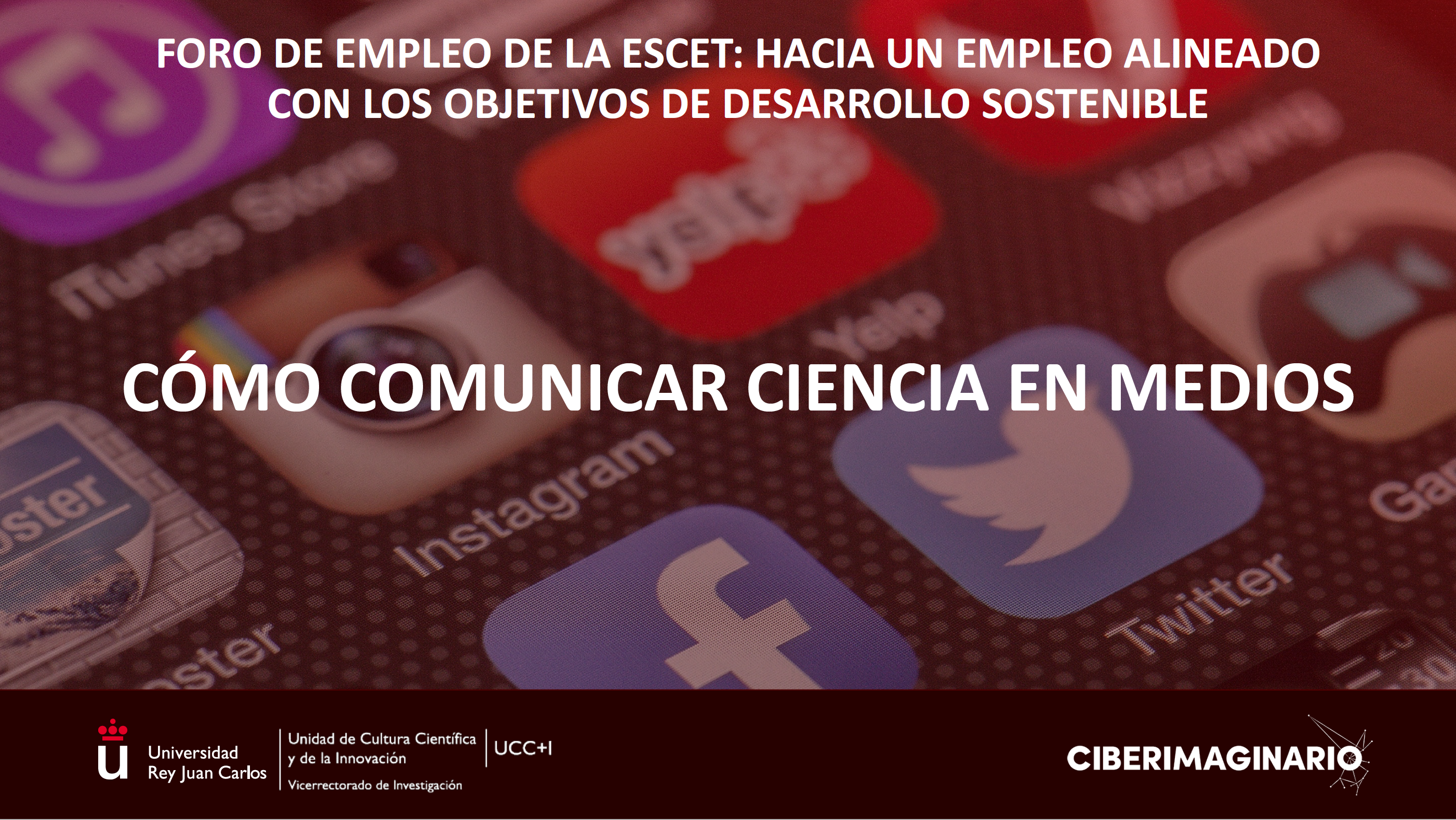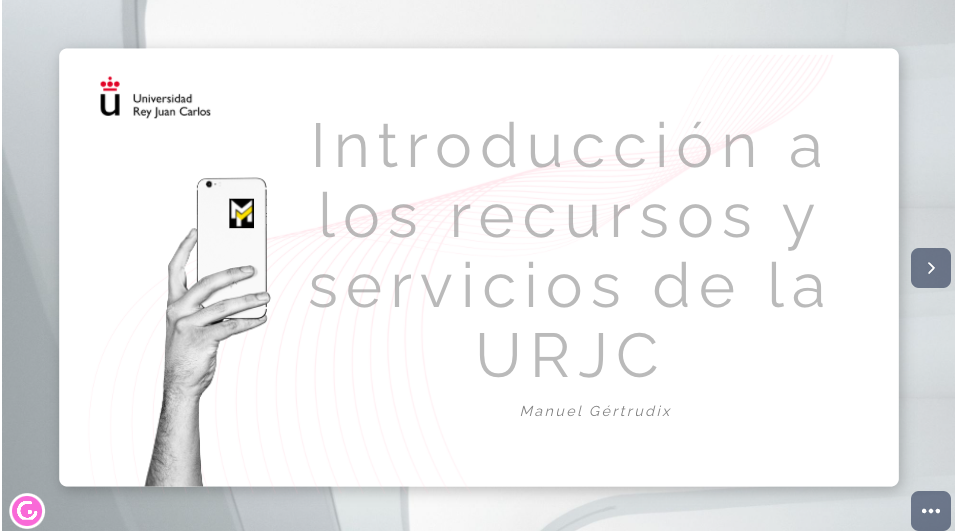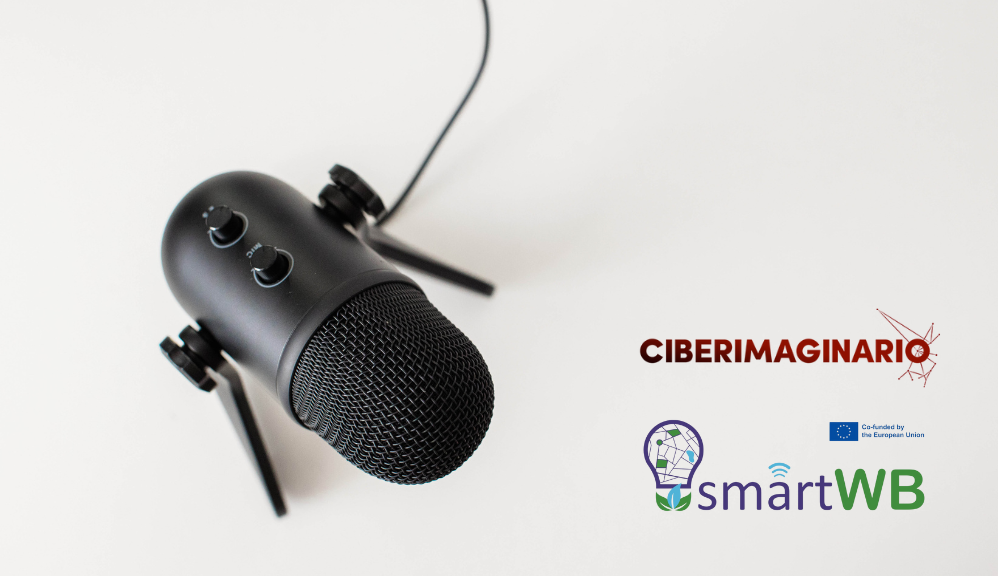 Classroom Ciberimaginario
Classroom Ciberimaginario
14 Cursos

Estrategias digitales para la mejora de la visibilidad, indexación y posicionamiento científico (Fundación madri+d) 2025
El curso tiene como objetivo ofrecer una visión comprensiva del modelo actual de posicionamiento científico a partir de la comunicación integral de los resultados de investigación. Se conocerán algunas de las técnicas y herramientas para optimizar la presencia digital de las publicaciones científicas, facilitando su descubrimiento en las principales bases de datos académicas como en medios y fuentes que permiten ampliar el impacto científico y social.
Curso organizado por EDIH (European Digital Innovation Hub Madrid Region) de la Fundación para el Conocimiento madri+d y el Grupo Ciberimaginario de la Universidad Rey Juan Carlos.

CiberKnowledge
Seminario permanente
El taller tiene como objetivo proporcionar una exploración exhaustiva de las solicitudes de subvenciones para el periodismo. Diseñada para personas interesadas en recaudación de fondos relacionada con los medios, la sesión aborda aspectos esenciales, desde estrategias efectivas de búsqueda de subvenciones hasta fundamentos de gestión de proyectos y medición de impacto.

Elaboración y uso de Podcast para la Comunicación Científica - UCM - 2025
En este curso descubriremos las posibilidades educativas del pódcast en la docencia universitaria; un formato versátil y sencillo para acercar los contenidos a nuestros estudiantes de una manera atractiva. Tras un primer repaso sobre sus principales características, conoceremos algunos de los mejores ejemplos de pódcast educativos que nos servirán para tomar algunas ideas que podamos aplicar a nuestro pódcast. Pasando de la teoría a la práctica, estableceremos el recorrido que va desde la planificación e idea base del guion, a la publicación y difusión, pasando por el proceso de grabación y edición. Ello nos permitirá sentar las bases sobre las que podrás desarrollar el primer capítulo de tu pódcast.

COARA, Alineación institucional
El curso tiene como objetivo ofrecer una visión comprensiva del modelo actual de posicionamiento científico a partir de la comunicación integral de los resultados de investigación. Se conocerán algunas de las técnicas y herramientas para optimizar la presencia digital de las publicaciones científicas, facilitando su descubrimiento en las principales bases de datos académicas como en medios y fuentes que permiten ampliar el impacto científico y social.
Curso organizado por EDIH (European Digital Innovation Hub Madrid Region) de la Fundación para el Conocimiento madri+d y el Grupo Ciberimaginario de la Universidad Rey Juan Carlos.

CiberKnowledge
Elaboración y uso de Podcast para la Comunicación Científica - UCM
En este curso descubriremos las posibilidades educativas del pódcast en la docencia universitaria; un formato versátil y sencillo para acercar los contenidos a nuestros estudiantes de una manera atractiva. Tras un primer repaso sobre sus principales características, conoceremos algunos de los mejores ejemplos de pódcast educativos que nos servirán para tomar algunas ideas que podamos aplicar a nuestro pódcast. Pasando de la teoría a la práctica, estableceremos el recorrido que va desde la planificación e idea base del guion, a la publicación y difusión, pasando por el proceso de grabación y edición. Ello nos permitirá sentar las bases sobre las que podrás desarrollar el primer capítulo de tu pódcast.

Elaboración y uso de Pódcast para la comunicación científica
En este curso descubriremos las posibilidades educativas del pódcast en la docencia universitaria; un formato versátil y sencillo para acercar los contenidos a nuestros estudiantes de una manera atractiva. Tras un primer repaso sobre sus principales características, conoceremos algunos de los mejores ejemplos de pódcast educativos que nos servirán para tomar algunas ideas que podamos aplicar a nuestro pódcast. Pasando de la teoría a la práctica, estableceremos el recorrido que va desde la planificación e idea base del guion, a la publicación y difusión, pasando por el proceso de grabación y edición. Ello nos permitirá sentar las bases sobre las que podrás desarrollar el primer capítulo de tu pódcast.

CiberKnowledge
Estrategias digitales para la mejora de la visibilidad, indexación y posicionamiento científico (Navarrabiomed)
El curso tiene como objetivo ofrecer una visión comprensiva del modelo actual de posicionamiento científico a partir de la comunicación integral de los resultados de investigación. Se conocerán algunas de las técnicas y herramientas para optimizar la presencia digital de las publicaciones científicas, facilitando su descubrimiento en las principales bases de datos académicas como en medios y fuentes que permiten ampliar el impacto científico y social.
Curso organizado por EDIH (European Digital Innovation Hub Madrid Region) de la Fundación para el Conocimiento madri+d y el Grupo Ciberimaginario de la Universidad Rey Juan Carlos.

Estrategias digitales para la mejora de la visibilidad, indexación y posicionamiento científico (Fundación madri+d)
El curso tiene como objetivo ofrecer una visión comprensiva del modelo actual de posicionamiento científico a partir de la comunicación integral de los resultados de investigación. Se conocerán algunas de las técnicas y herramientas para optimizar la presencia digital de las publicaciones científicas, facilitando su descubrimiento en las principales bases de datos académicas como en medios y fuentes que permiten ampliar el impacto científico y social.
Curso organizado por EDIH (European Digital Innovation Hub Madrid Region) de la Fundación para el Conocimiento madri+d y el Grupo Ciberimaginario de la Universidad Rey Juan Carlos.

CiberKnowledge
Cómo comunicar ciencia en medios
En este taller se recogen las claves saber cómo comunicar ciencia y aprender la importancia de saber comunicar el trabajo científico por los medios de comunicación tradicionales.

CiberKnowledge
Comunicación científica
Actividades del Seminario Permanente sobre Comunicación científica del Grupo de investigación Ciberimaginario

Taller de redes sociales
Sesión destinada a conocer cuáles son las principales características y recomendaciones que debemos tener en cuenta a la hora de gestionar nuestro perfil en redes sociales, de forma que los procesos de comunicación y difusión que iniciemos alcancen la mayor efectividad posible.

Taller: Crea un podcast para tu asignatura
En este curso descubriremos las posibilidades educativas del pódcast en la docencia universitaria; un formato versátil y sencillo para acercar los contenidos a nuestros estudiantes de una manera atractiva. Tras un primer repaso sobre sus principales características, conoceremos algunos de los mejores ejemplos de pódcast educativos que nos servirán para tomar algunas ideas que podamos aplicar a nuestro pódcast. Pasando de la teoría a la práctica, estableceremos el recorrido que va desde la planificación e idea base del guion, a la publicación y difusión, pasando por el proceso de grabación y edición. Ello nos permitirá sentar las bases sobre las que podrás desarrollar el primer capítulo de tu pódcast.

CiberKnowledge
Welcome URJC - Investigadores - Ciberimaginario
En este taller se presentan algunos de los recursos esenciales para comenzar la andadura en la Universidad Rey Juan Carlos para investigadores y profesores que se incorporan al Grupo Ciberimaginario, o que realizan una estancia de investigación o de docencia.

Workshop: Create a podcast
In this course we will explore the pedagogical possibilities of podcasting in higher education; a versatile and simple format to deliver content to our students in an engaging way. After an initial overview of the main features, we will learn about some of the best examples of educational podcasts that will help us get some ideas for our own podcasts. From theory to practise, we will follow the path from planning and the basic idea of the script to publishing and distribution, going through the recording and editing process. In this way we will create the foundations on which you can develop the first episode of your podcast.